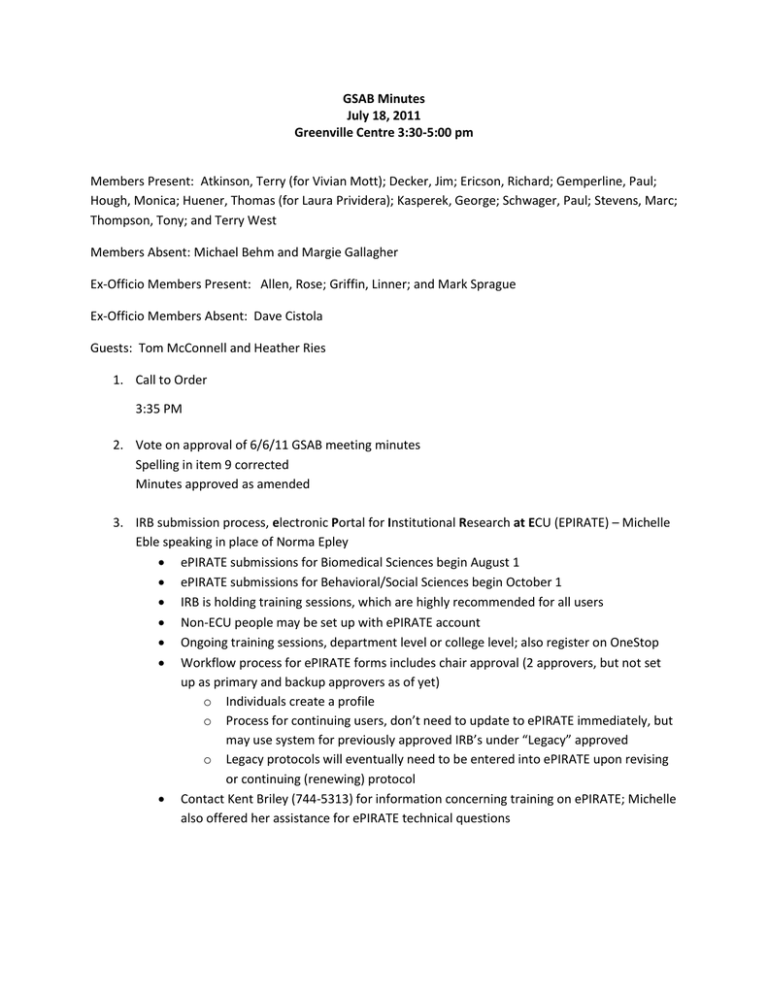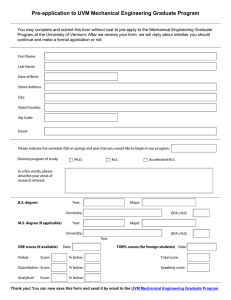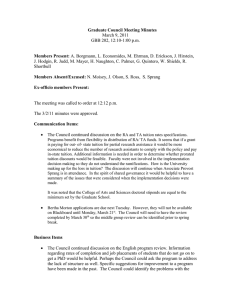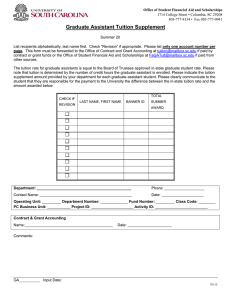July 18
advertisement

GSAB Minutes July 18, 2011 Greenville Centre 3:30-5:00 pm Members Present: Atkinson, Terry (for Vivian Mott); Decker, Jim; Ericson, Richard; Gemperline, Paul; Hough, Monica; Huener, Thomas (for Laura Prividera); Kasperek, George; Schwager, Paul; Stevens, Marc; Thompson, Tony; and Terry West Members Absent: Michael Behm and Margie Gallagher Ex-Officio Members Present: Allen, Rose; Griffin, Linner; and Mark Sprague Ex-Officio Members Absent: Dave Cistola Guests: Tom McConnell and Heather Ries 1. Call to Order 3:35 PM 2. Vote on approval of 6/6/11 GSAB meeting minutes Spelling in item 9 corrected Minutes approved as amended 3. IRB submission process, electronic Portal for Institutional Research at ECU (EPIRATE) – Michelle Eble speaking in place of Norma Epley ePIRATE submissions for Biomedical Sciences begin August 1 ePIRATE submissions for Behavioral/Social Sciences begin October 1 IRB is holding training sessions, which are highly recommended for all users Non-ECU people may be set up with ePIRATE account Ongoing training sessions, department level or college level; also register on OneStop Workflow process for ePIRATE forms includes chair approval (2 approvers, but not set up as primary and backup approvers as of yet) o Individuals create a profile o Process for continuing users, don’t need to update to ePIRATE immediately, but may use system for previously approved IRB’s under “Legacy” approved o Legacy protocols will eventually need to be entered into ePIRATE upon revising or continuing (renewing) protocol Contact Kent Briley (744-5313) for information concerning training on ePIRATE; Michelle also offered her assistance for ePIRATE technical questions 4. Consent agenda items, all approved: COE, Adult Ed, 1st request for time extension, through spring 2012 (18 hrs) COE, Higher Ed, 1st request for time extension, through 2nd summer (30 hrs) COB, MBA, request for time extension, through fall 2011 (12 hrs) 5. Student request for partial exception to professional track admission (waive GRE) Student submitted a special request, supported by Technology Systems, to the GSAB for admission to the ECU graduate school via the Professional Track option, which would waive the GRE requirement Student has the ten plus years of professional experience to qualify for this option, but not the corollary Graduate Catalog requirement of his baccalaureate degree being more than 10 years old (this student graduated with ECU Bachelor’s degree in May, 2011) Part of the intent of the Professional Track admission program is to encourage professional people to enroll in graduate school The intent of the Professional Track admission also is designed to provide benefit to people that have not experienced academic entrance-type examinations in ten or more years; their GRE examination scores provide additional data, but is not the only data considered for entrance into the ECU Graduate School Request denied: 8 votes to deny exemption to requirement, 2 votes to grant exception, 2 abstentions 6. Vote on approval of GCC minutes from 7-11-2011 meeting Content of minutes were the election of Will Forsythe and Carol Brown by the GCC for the two GCC vacancies Within Appendix F of the faculty manual are clear indications that members of the GCC must be full graduate faculty members, limiting selection of nominees There is a precedent in the GCC for the election of administrators that hold a percentage of their official faculty position, but this may be of some concern because graduate curricula is the purview of (graduate) faculty; chairs are also considered to be faculty Minutes were approved by acclamation, thereby approving Will Forsythe and Carol Brown as replacement members (for remaining two year terms) of the GCC 7. Discussion on eligibility standards for tuition remissions; Cashier’s office procedures put in place after audit Tuition remissions are one of our scarcest, most important critical resources Students placed in a payback situation for tuition remissions if they drop courses in the middle/latter part of a semester The Cashier’s office now has procedures in place to prevent reimbursements for tuition remission (for dropped courses, depending on timing) going to students that have received tuition remissions and dropped courses, so that language can now be dropped from graduate policy In some cases, departments rely on these graduate students to teach laboratory sections of courses, through to nearly the end of the course, as opposed to dropping early There may be unique circumstances that should be taken into account when a student drops a course (for which they received a tuition remission), and graduate program directors and the dean of the graduate school need to use sound judgment in evaluating each of these circumstances; the students receiving tuition remissions are most often our best academic students Best to avoid dropping, then having to retake a course, if at all possible because it is a waste of the valuable tuition remission dollars, university resources, and time for all involved There is agreement that enrolled students must be in good academic standing (GPA 3.0 minimum) to retain the tuition remission Considering policy change that would increase the standards for tuition remissions to students receiving scores of at least 45% on GRE, as well as removing language about students in a payback situation being financially responsible The intent in the proposal was to set 45% on the GREs as a combined average for consideration of receipt of a tuition remission, but perhaps the 30% GRE standard admission mark is sufficient, as units already make very careful well-thought-out decisions for awarding their limited number of tuition remissions Need for some kind of language, regarding awarding & continuation of tuition remissions, perhaps one or a combination of these (final wording will be brought forward for approval this fall): o Must remain a full-time student o Must remain in good academic standing (GPA minimum 3.0) o Must make appropriate progress towards degree Students receiving tuition remissions and taking online courses (eg 601 sections) can be identified (few enough to handle on case-by-case basis) via BIC reports and unit confirmation; the cost of these classes are covered for on-campus tuition-remission students Tuition remissions for Master’s students are generally limited to four semesters; the graduate school can pull (from Banner) certain line expenditures for graduate assistants and determine with good accuracy, for tracking this parameter Some departments have internal limits of tuition remissions of one year for Master’s students; departmental discretion with this valuable resource maximizes efficiency Time limits of tuition remissions for doctoral students are self-enforcing and follow limits of time allowed for degree 8. Procedure for appealing dismissal on basis of GPA – refining catalog language Notion was to consider changes in policy to clarify language on procedures, that low academic standing is not grounds for an appeal of dismissal Generally agreed upon that an appeals process is important for all Decision to not alter the policy at the present time 9. Discussion on standards and procedures for utilization of TOEFL (Test of English as a Foreign Language) scores in acceptance decisions The ECU minimum TOEFL requirement is a score of 80 (4 sections with a score of 20 in each section) Dr. Gemperline researched the TOEFL requirements of ECU’s sister and peer institutions and found a score of 20 in each section is considered to be the best cut-off score o Exceptions may be made on a case by case basis for students with scores of 18 or 19 in a couple of sections o As with GRE acceptance standards, these acceptance level scores are not published in the graduate catalog, as with many universities Agreement to maintain these acceptance scores, and place the specific information in the Graduate Program Directors Handbook Instances of irregularity in testing and TOEFL scores have recently been found by ETS, and two such cases have been reported to dean Gemperline 10. Discussion on sharing credit among programs or when a program change occurs (reference Dual Degree program policy and change of program) Dr. Gemperline explained a prior instance where a student earned a cumulative GPA below 3.0; the student transferred to another program within the same department, transferring courses except for the two in which he received an “F” The proposed 20% course transfer amount parallels the number of credits allowed for transfer from an outside institution (or, typically, that would transfer to another institution from ECU) Banner might not be able to control or account for this specific proposal (20% “transfer”) Graduate students sometimes take courses outside their program, seemingly, in some cases, to raise their GPA; this situation may warrant consideration of a policy, in order to maintain academic rigor, that requires a GPA of 3.0 for courses within the student’s program, as opposed to the current situation of total GPA of 3.0 currently in place 11. Other Business Meeting of subcommittee on graduate faculty governance to meet July 22 12. Adjourn 5:25 PM Next meeting: To be determined Respectfully submitted, Tom McConnell



